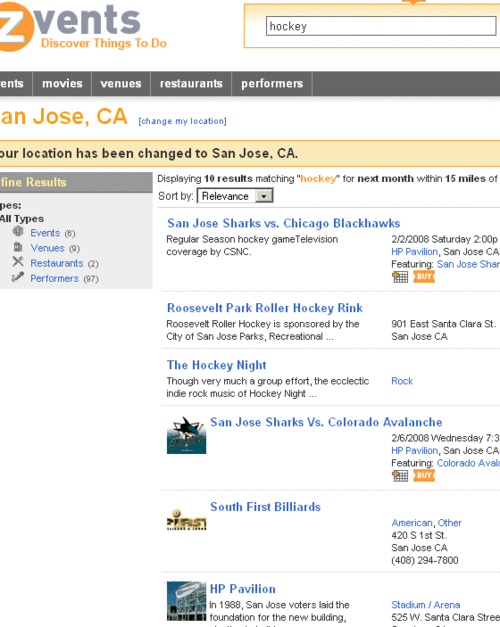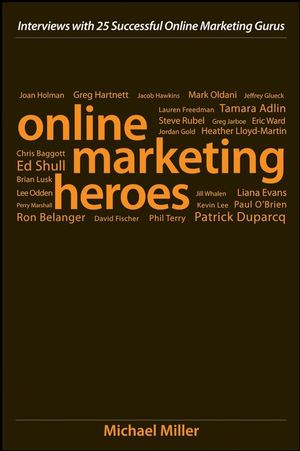Can I take a moment and violate what is perhaps one of the more pervasive of the seven deadly sins? I recently had the honor of playing a role (albeit a bit part) in the release of the first blended vertical search technology. Monday, time based local search engine Zvents released Federated Local Search blending sales, in-store events, classes, movies, restaurants, local performers, concerts, sports… and on and on goes the list, with traditional business listings in one search results page. Essentially, the only local search engine and platform that enables users to find all things local through one experience.
How is this different from Universal Search?
Earlier this year, Google released a search enhancement (though “enhancement” is still open to debate) that blends all forms of online content in one search result: video, weather, news, shopping, travel, etc. with web sites and pages. Yahoo kept in lock step with a version of their own, and Ask, leapfrogged both with a beautiful implementation. The criticism by many (see Impaqt’s Matt Naeger’s prediction), including myself, (though in defense of Universal, also note in those predictions that many favor Universal’s success) is that Universal search strives to be all things to all people, delivering a wide variety of results to a general web query. In doing so, they sacrifice relevance, giving up real estate that previously delivered a greater diversity of websites, to embed photos, video clips, and more. My search for Paris Hilton late at night is littered with photos and videos of the racy heiress instead of sites about Paris (France) and the Hilton hotel.
(what’d you think I wanted when searching for Paris Hilton late at night!?)
Here’s where that example is both bad and good at validating my prediction:
True, one can accurately suppose that Google can’t know if a search for Paris Hilton isn’t meant for the celebrity, but rather the city and hotel. With Universal Search, presenting all results enables the engine to more likely reach everyone. But what about the people who really only want photos and video? What about the audience with travel plans? In order to be all things to all people, Universal Search risks disappointing users with clearer intent. Thus, it loses users to other engines as they are motivated to try elsewhere to find what they want.
Shining Moment for Vertical Search
This is where vertical search plays an ever-increasing and important role. Vertical search allows the user to add context to the search, pre-defining their search as pertaining only to shopping, media, travel, local, blogs, etc.
Imagine a comparison shopping engine that truly searches all forms of commerce, not just products and prices from online merchants. Buy.com, Shopping.com, or TheFind would blend online products with autos, real estate, tickets, classifieds, auctions, brick and mortar inventory and pricing, bespoke (bet ya don’t know what that means! I had to look it up), and even groceries to allow users to more accurately, truly shop online for anything. You could argue that Amazon is close but they lack specific channels without say, tickets; eBay, perhaps too, but where are the groceries and brands we know and trust as merchants of record? Yes, people have bought just about everything through eBay but a truly federated experience blends all opportunities (that shirt I want from Gresham Blake isn’t there) not mere access to resolve the need. Google’s Universal Search doesn’t force you to watch YouTube videos by blending video with results, they blend other alternatives… (right?)
Federated Local Search
 Search a federated local search engine for “hockey” and get upcoming NHL games blended with the local arena, ice rinks, and skating classes; relevant and valuable local content. Try “Super Bowl” in Phoenix and obviously get details about Super Bowl XLII itself but also: the stadium, bars and restaurants featuring game day specials, related events such as the various fund raisers and celebrity appearances in town around the same time.
Search a federated local search engine for “hockey” and get upcoming NHL games blended with the local arena, ice rinks, and skating classes; relevant and valuable local content. Try “Super Bowl” in Phoenix and obviously get details about Super Bowl XLII itself but also: the stadium, bars and restaurants featuring game day specials, related events such as the various fund raisers and celebrity appearances in town around the same time.
True local search is so much more than a business listing. Instead it blends places to go, things to do, and people to see.
What does this mean for you?
I certainly hope you aren’t still optimizing for local search by merely submitting your business listing to the well-known search engines. Consider how local ad dollars are spent: promoting your brand, promoting your products, or promoting events? Spend some time with your local newspaper and you’ll see most of the ads promote sales, seminars, classes, in-store events (contests, fashion shows, celebrity appearances, etc.). Rarely in newspapers will you see an ad for just the business name and an address. So why is the leading edge of Local SEO all about serving the bare minimum; promoting just your business name and address? The only customer you’ll attract that way is the customer who already wants to patron your business. With this new federated local search platform, local search is about where, who, and what; your business listing, attractive personalities (people that the public wants to see, not literally ‘attractive’ … well… okay, they’re one and the same aren’t they?), and that attraction you advertise in order to draw folks in the door. All you have to do is add those listings to get indexed.
A local Circuit City recently promoted (heavily I might add so at great cost I suspect) an Xbox 360 match with pro football player appearances and chances to win an HDTV. At the same time they had a sale on games and accessory merchandise. You want to reach everyone searching through local search not just those looking for your business (just as Google helps users find your website for themes not directly related to your business). But how? Traditional local search only enables users looking for Circuit City to find the store. Zvents reaches users searching for football, Jerry Rice, video games, gaming, sales, shopping, technology, or NFL, informing them that there’s an event this weekend at Circuit City that is right up their alley. What’s more, listing with Zvents has massive reach through hundreds of syndicated partners; as the only time-based local search technology, Zvents is the platform for media companies and publishers who want local content, search, and things to do.
As you can tell from this unusually long winded *ahem* post, I’m falling out of my seat every few minutes with excitement. The future of Universal Search is within the vertical as context-based engines significantly enhance the user experience, inevitably bringing more visitors to your door. Come on in, feel that excitement, and take advantage of the next generation of local search.
For more check out
- – Another snapshot on Flickr associated with a great article from Chris Silver Smith at naturalsearchblog (Chris will be discussing Local Search & Blended Results at the upcoming SMX West conference in Santa Clara – I suspect Zvents will come up…)
- – Andrew Shotland’s Local SEO Guide which reinforces the opportunity to list events
- – Screenwerk from Greg Sterling which nicely grasps the evolution that led to Federated Local Search
- – Website Magazine’s highlight of the opportunity to get into the major media companies with just one submission to the index
- – Local Biz Bits perspective on promoting events online
- – Federated Search Press for the latest federated search news
- – Grab this brilliant search diagram which maps the search landscape
Or get a glimpse of the next big development in search from Skrentablog


First time I tested Zvents.com. It is pretty cool. Thanks for sharing your experience with us…
As horizontal search engines try to become everything to everybody, vertical and local search engines will be the future when looking to find information within specific subject areas. Vertical Search software companies like SearchBlox and Convera seem to play well in this space.